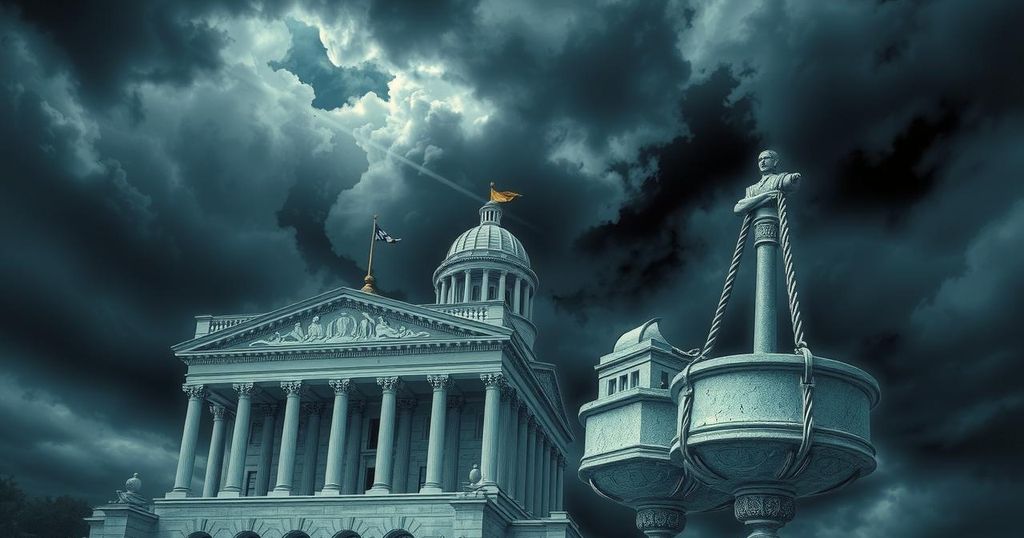The Dismemberment of Democracy in Nigeria

Under President Bola Ahmed Tinubu, Nigeria’s democracy faces serious challenges as nepotism, electoral fraud, and suppression of opposition are on the rise. The Independent National Electoral Commission has failed to adequately serve citizens’ voting rights, while Tinubu’s unilateral decisions raise concerns about governance. Citizens must rally together to defend their democratic rights against the growing authoritarianism.
The concept of democracy is rooted in equal opportunity for all, emphasizing accountability, tolerance, and adherence to the rule of law. However, under President Bola Ahmed Tinubu, Nigeria has seen troubling departures from these democratic ideals. The administration’s failures have affected various sectors, from the economy to governance, leading to widespread dissatisfaction among citizens.
A prime concern is how the Independent National Electoral Commission (INEC) has underperformed. Originally tasked with ensuring voter registration and monitoring elections, INEC has been criticized for providing permanent voter cards to an alarming low percentage of applicants, around just 30% since 2015. This has resulted in many Nigerians being disenfranchised when it comes to exercising their voting rights.
Additionally, Tinubu’s government has displayed favoritism through nepotism in various appointments. The principle of Federal Character, designed to provide equal representation across Nigeria’s diverse ethnic groups, has seemingly been ignored. Appointments at all levels of government, particularly in security, have favored Tinubu’s Yoruba kin and close allies, raising serious concerns about transparent governance.
One glaring example is the Lagos-to-Calabar Coastal Road project—a staggering $700 billion project awarded without going through proper review or legislative approval. The decision benefitted Mr. Chagoury, a known friend of the president, showcasing a blatant disregard for process and legality. This kind of action demonstrates how centralization of power has occurred under Tinubu’s administration.
Moreover, the separation of powers principle, foundational to democracy, has been undermined. Tinubu appears to consolidate authority, making unilateral decisions while ignoring the checks and balances typically inherent in a democratic government structure. This consolidation leaves no room for dissent or effective opposition, as power rests heavily with the presidency.
The situation is compounded by Tinubu’s apparent war against opposition parties, particularly the Peoples Democratic Party (PDP). By planting agents within rival parties and targeting political figures to switch allegiance to the All Progressives Congress (APC), he aims to weaken all political competition. Additionally, notable figures like Peter Obi from the Labour Party have faced smears, further indicating an attempt to diminish any significant opposition.
Strikingly, Tinubu has not only targeted political adversaries but also civil society groups and journalists, censoring voices demanding accountability. In a bold move in May 2025, he declared himself the sole candidate for the APC without any party-wide vote, a clear violation of democratic processes and norms. Such actions reflect a growing trend toward autocracy, underlining a widening chasm in his commitment to democracy.
As Nigeria gears up for the 2027 elections, the urgency of resisting Tinubu’s authoritarian tactics is paramount. The fight for democratic rights must be championed by all citizens, who should remain vigilant against efforts to suppress their fundamental right to choose their leaders. Only through collective action can the people reclaim the democracy that appears increasingly fragile under Tinubu’s tenure.
In summary, the erosion of democratic principles under President Tinubu poses a significant threat to Nigeria’s political landscape. His administration’s actions suggest a troubling path towards autocratic governance, characterized by nepotism, suppression of opposition, and disregard for democratic processes. As the nation approaches the general elections in 2027, it is imperative for citizens to stand united in defending their democratic rights and resist these encroachments on their political freedoms.
Original Source: tribuneonlineng.com







